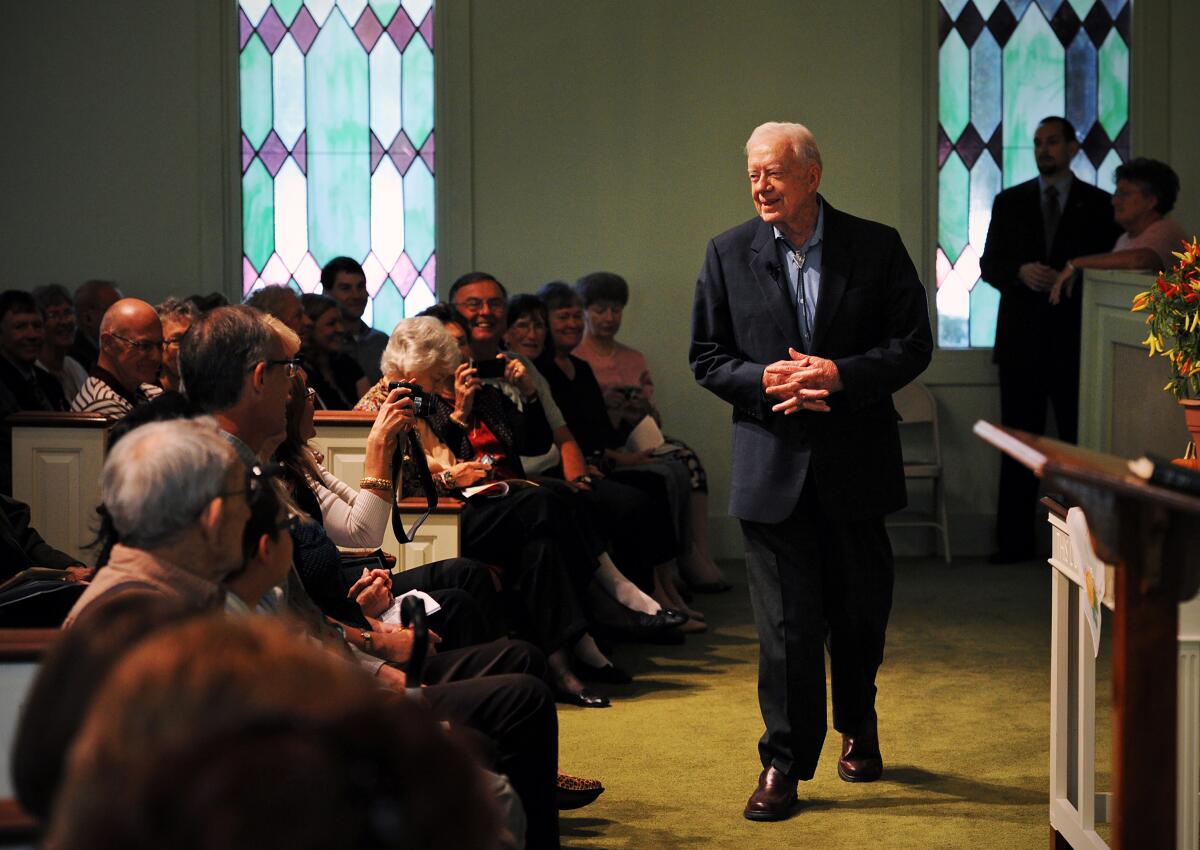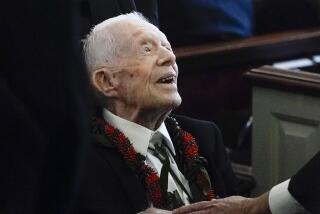Commentary: The paradox of Jimmy Carter

Joe Biden was the first U.S. senator to endorse Jimmy Carter for president in 1976. Now, as his presidency gets underway in earnest, Biden could do worse than emulate his old friend.
Not Carter the politician, but Carter the president.
When it came to politics, Carter could be ruthless. Gonzo journalist Hunter S. Thompson wrote that he thought the Georgian was one of the “meanest men” he had ever met. Thompson meant that Carter was willing to do whatever it took to get elected.
During his 1970 gubernatorial race, for instance, Carter presented himself as a populist, appealing to both white voters and Black. But he was perfectly willing to send deft dog whistles of support to rural poor whites who were abandoning public schools for all-white private “academies.” Then, on the day of his inauguration as governor he shocked those same white people by bluntly proclaiming that “the time for racial discrimination in Georgia is over.”
In 1974, when he was quietly beginning to launch his improbable campaign for president, he gave a speech in the presence of Sen. Edward M. Kennedy — at the time, his chief rival — in which he made it clear that he could hold his own against the heir to Camelot. “Carter cut him down that day,” observed the writer Garry Wills, “deftly, politely, but unmistakably.” Kennedy decided not to run in 1976.
Forty years after he left the Oval Office, most Americans associate this most enigmatic of our presidents with his humanitarian projects on behalf of Habitat for Humanity or his efforts to wipe out Guinea worm disease in Africa. Pundits quip that he is the only ex-president to have used the White House as a steppingstone to more worthy achievements. We don’t think of him as a shrewd, pragmatic or ruthless politician.
This is a mistake. Carter had an uncanny political sense, meaning that he knew exactly what voters wanted to hear. He proved this by the fact that he got himself elected president as a liberal Southern white man.
But here’s what was unusual about him. Once he took office as president, he repeatedly told his aides that he didn’t want to hear their arguments about what was politically expedient. Instead, he was determined as president to use his brain and his judgment to figure out what was the right thing to do — and do it, regardless of the political consequences. In office, “Carter thought politics was sinful,” said his vice president, the late Walter Mondale. “The worst thing you could say to Carter if you wanted him to do something was that it was politically the best thing to do.”
Despite his aversion to political machinations — such as cutting deals with smarmy congressmen — Carter was an effective and extraordinarily productive president. He deregulated the airline industry, making it possible for middle-class Americans to fly. He forced the auto companies to accept mandatory seat-belt regulations and air-bag technology, thus saving at least 9,000 lives annually. He transformed the judiciary, appointing more African Americans and Latinos to the federal bench than all his predecessors combined. He added millions of acres to America’s wilderness preserves.
In foreign affairs, he secured Senate ratification of the Panama Canal Treaty, negotiated a SALT II arms-control agreement with the Soviet Union and personally brokered the Camp David accords. The principle of human rights became a cornerstone of America’s foreign policy. He shrugged off Cold War shibboleths, shocking the pundit class by proclaiming: “Being confident of our own future, we are now free of that inordinate fear of communism which once led us to embrace any dictator who joined us in our fear.”
But Carter’s achievements came with enormous political costs. Seven Democratic senators lost their reelection bids thanks to their votes for the Panama Canal Treaty. Big Oil and the Detroit auto industry defeated his bid for a windfall profits tax and heavily funded his Republican challenger, Ronald Reagan, in 1980. Trade unions opposed his deregulation of airlines, trucking and railroads — and in 1980, he won only a small plurality of voters in trade union households.
A self-described born-again Christian, Carter won the evangelical vote in 1976 — but lost it in 1980, largely because he revoked the tax-exempt status of all-white Christian schools. In 1980, he became the only modern Democrat to lose a majority of the Jewish vote, because he had pushed the Israelis so hard to stop building settlements in the West Bank.
Though he was from Georgia, he lost two-thirds of the voters from the former Confederacy when he ran for a second term.
Here is the paradox of Jimmy Carter: He was a ruthless politician who knew how to win power, but having captured the presidency, he felt unshackled and free to do only what was right by his personal judgment. In this he was guided philosophically by Reinhold Niebuhr, his favorite theologian, whose book “On Politics” was his own personal “political bible.” A realist and skeptic about human nature, Niebuhr argued that those privileged enough to wield political power had a responsibility to use their power on behalf of justice. Carter frequently quoted Niebuhr’s injunction that it is “the sad duty of politics to establish justice in a sinful world.” He became a Niebuhrian Southern Baptist — a rather singular church of one devotee.
For Carter, who is 96 years old today and living, as always, in Plains, Ga., doing the right thing was the only justification for his raging political ambitions.
Righteousness was both the key to his success and his greatest weakness. It explains his accomplishments but also why he was not reelected. And while he hated to lose, he had no doubt that he had done the right thing.
He was a most unusual president, one not emulated by any of his successors. Look at any of the images of all the ex-presidents standing together. Carter is always off to one side, ever so slightly social-distanced. The images suggest a certain distrust; they are uneasy in his presence, suspecting that he is standing in judgment. He is not one of them; he is the outlier.
Joe Biden, though, has a long-standing friendship with Carter and made a pilgrimage to Plains during the 2020 campaign. Whether that means he sees Carter as a president to emulate is something we’ll have to wait to find out.
Kai Bird is a Pulitzer Prize-winning historian, the director of the Leon Levy Center for Biography at CUNY and the author of “The Outlier: The Unfinished Presidency of Jimmy Carter.”
More to Read
A cure for the common opinion
Get thought-provoking perspectives with our weekly newsletter.
You may occasionally receive promotional content from the Los Angeles Times.










